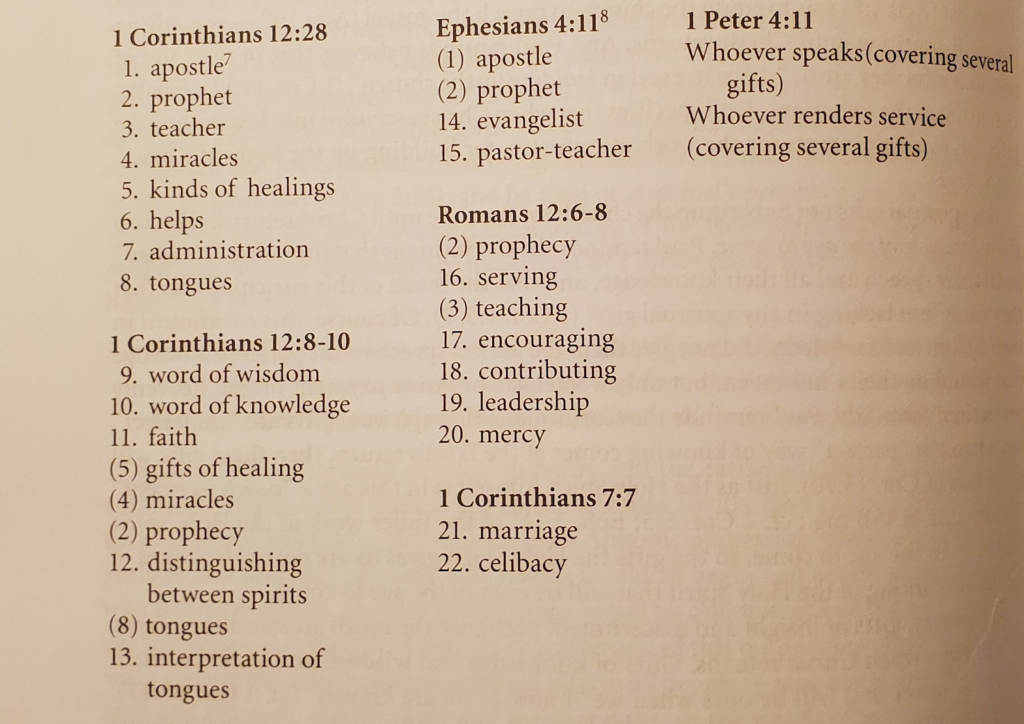Reading Systematic Theology with Wayne Grudem – What are spiritual gifts? How many are there? Have some gifts ceased? Seeking and using spiritual gifts.
This post is part of a 50+ post series from the classic work by Wayne Grudem (PhD, Cambridge), Systematic Theology: An Introduction to Biblical Doctrine. The aim of each post is to provide an overview of each chapter in the book and related resources for each topic.
Synopsis of Chapter
Wayne Grudem wrote two chapters on the Gifts of the Holy Spirit. This topic is of particular interest since he wrote his Ph.D dissertation at Cambridge on the gift of prophecy in 1 Corinthians. In the first chapter on the gifts of the Holy Spirit (52), Grudem provides an overview of spiritual gifts. Grudem discusses how many gifts there are, whether they vary in strength, the permanence of the gifts, the miraculous nature of the gifts, whether some gifts have ceased, and how spiritual gifts may challenge the sufficiency of Scripture.
Spiritual Gifts in the Bible
A spiritual gift can be defined as “any ability that is empowered by the Holy Spirit and used in any ministry of the church.” This includes gifts that include “natural abilities” like teaching and administration, and more “miraculous” gifts like prophecy and healing.
God has gifted spiritual abilities throughout the history of redemption. Moses, Elijah and other prophets saw and performed miracles during their ministries. But it was not as widespread as what was prophesied through Joel:
And it shall come to pass afterward,
that I will pour out my Spirit on all flesh;
your sons and your daughters shall prophesy,
your old men shall dream dreams,
and your young men shall see visions.
Even on the male and female servants
in those days I will pour out my Spirit.
(Joel 2:28-29)
When Jesus started the New Covenant, the Holy Spirit was poured out at Pentecost and the Scripture began to be fulfilled. The gifts became more widespread. Paul gives the reason for spiritual gifts in the church: “to equip the saints for the work of ministry, for building up the body of Christ” (Ephesians 4:12). So the reason we see spiritual gifts is for the church’s spiritual growth.
How Many Gifts Are There?
There are several lists of spiritual gifts in the New Testament. According to these passages in 1 Corinthians, Ephesians, Romans, and 1 Peter, there are 22 named spiritual gifts. However, the lists of gifts are not identical and seemingly not comprehensive. In other words, God may have given other gifts to the church that are not explicitly mentioned in these passages.

Gifts Vary in Strength
Gifts vary in strength in the church. Some have a stronger gifting while others don’t have the same gifting at all. But each of the gifts are given for the building up of the church (1 Corinthians 14:12). There are several Scriptural reasons to believe that gifts are not the same for each person.
- Timothy is reminded to “fan into flame the gift of God” (2 Timothy 1:6). This seems to suggest that his gifting could be weak or stronger depending on the “fan”.
- Apollos was an “eloquent man, competent in the Scriptures.” (Acts 18:24)
- Paul spoke in tongues more than all the Corinthian believers (1 Corinthians 14:18).
- Not everyone has the same gift (1 Corinthians 12:29-30).
- We have gifts that differ according to the grace given to us (Romans 12:6).
Temporary or Permanent Gifts
Spiritual gifts also appear to be given permanently most of the time. Some people can be called “prophets” or “teachers” (1 Corinthians 12:29) and Paul said he “has prophetic powers” (1 Cornithians 13:2). This suggests Christians possess certain gifts indefinitely. On the other hand, other passages speak of not neglecting a spiritual gift (1 Timothy 4:14). Moreover, marriage is, by nature, a temporary gift – nobody is married for their entire life (1 Corinthians 7:7). So gifts may be permanent, but on some occasions can be temporary.
Miraculous or Non-Miraculous Gifts
Spiritual gifts can be defined as miraculous and non-miraculous depending on the definition of miracle. If miracles are more narrowly defined as “a less common activity of God in which he arouses people’s awe and wonder and bears witness to himself”, then spiritual gifts would be both miraculous and non-miraculous. For instance, if someone is prophesying and an unbeliever is amazed and convicted, that could be considered miraculous (1 Corinthians 14:24-25). But acts of mercy, though important, do not appear to be miraculous (Romans 12:8).
Discovering and Seeking Spiritual Gifts
What about discovering our personal spiritual gifts? There are several biblical injunctions and principles on finding and using our spiritual gifts:
- We are commanded to use our spiritual gifts (1 Peter 4:10).
- Timothy was commanded not to neglect his spiritual gift (1 Timothy 4:14).
- We should desire the higher spiritual gifts (1 Corinthians 12:31).
- Those who speak in tongues should pray to interpret tongues (1 Corinthians 14:13).
- We should excel in the gifts that build up the church (1 Corinthians 14:12).
- Spiritual gifts are distributed as God chooses (1 Corinthians 12:18).
Have Some Gifts Ceased: The Cessationist Debate
Within the evangelical church, there are three groups of people regarding spiritual gifts. The charismatics and Pentecostals, also called “continuationists” believe most of the spiritual gifts are currently active in the church today. On the opposite side of the questions are the “cessationists” who believe many of the spiritual gifts have ceased in the church. In the middle are the “mainstream evangelicals” who are undecided or unsure if this question can be decided in Scripture.
There are several arguments cessationists use to suggest some spiritual gifts have ceased in the church. For instance, they point to 1 Corinthians 13 which says prophecies “will pass away” and tongues “will cease”.
“Love never ends. As for prophecies, they will pass away; as for tongues, they will cease; as for knowledge, it will pass away. For we know in part and we prophesy in part, but when the perfect comes, the partial will pass away. When I was a child, I spoke like a child, I thought like a child, I reasoned like a child. When I became a man, I gave up childish ways. For now we see in a mirror dimly, but then face to face. Now I know in part; then I shall know fully, even as I have been fully known.” (1 Corinthians 13:8-12)
It is true the text speaks of these gifts going away. The key question is when will these gifts stop? The passage later confirms “when the perfect comes, the partial will pass away.” If that means when Jesus returns (which is what the text seems to suggest), then this passage has not been fulfilled yet; Jesus has not returned and the “perfect” has not come. If the passage refers to a time earlier than the return of Christ, then it may suggest that some gifts will stop. Usually, cessationists point to the completion of the New Testament canon. This does not appear to be a supportable reading in the chapter.
Another argument cessationists use to support some spiritual gifts stopping is the continuation of prophecy challenges the sufficiency of Scripture. This is a strong argument in favor of cessationism. If New Testament congregational prophecy was like Old Testament prophecy, then these would be the very words of God and we would be writing new books of the Bible whenever a prophecy was spoken. But if these words are merely human words subject to the authority of Scripture and the judgment of mature Christians, then it would not challenge the sufficiency of Scripture. The spoken prophetic words after the New Testament times would be human words, though helped along by the Holy Spirit.
Application: Cessationists & Continuationists Need Each Other
Personally, I have learned much from both cessationists and charismatics. In the cessationist camp, I have appreciated the biblical exegesis and appreciation for God’s word. One of the reasons they don’t allow additional prophecies is their reverence for Scripture and that is commendable. However, continuationists have also greatly helped my faith. Their belief that God is still active today and guiding his church on a day-by-day basis brings a vibrancy in the church that can sometimes be lacking in cessationist circles. Continuationists can benefit from the experience of cessationists and vice versa.
As each has received a gift, use it to serve one another, as good stewards of God’s varied grace: whoever speaks, as one who speaks oracles of God; whoever serves, as one who serves by the strength that God supplies—in order that in everything God may be glorified through Jesus Christ. To him belong glory and dominion forever and ever. Amen. (1 Peter 4:10-11)
Special Terms
- apostle
- cessationist
- distinguishing between spirits
- gifts of the Holy Spirit
- healing
- interpretation of tongues
- miracles
- miraculous gifts
- nonmiraculous gifts
- office
- prophecy
- speaking in tongues
- teaching
- word of wisdom
- word of knowledge
Resources: Wayne Grudem
- Wayne Grudem: Book: Systematic Theology: An Introduction to Biblical Doctrine
- Wayne Grudem: 148 Lectures on Systematic Theology at Scottsdale Bible Church
Related Resources
- OpenBible.info: Verses on Gifts of the Holy Spirit
- Brannon Deibert: What are the Gifts of the Holy Spirit?
- Sam Storms (continuationist): Spiritual Gifts Video on Desiring God (17:46)
- Thomas Schreiner: Why I Am a Cessationist
Image credit from Leone Venter on Unsplash.



